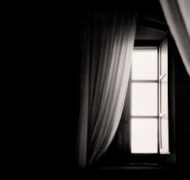When Grandpa Died
Blog / Produced by The High Calling
It's early afternoon. Despite sun pouring through the windows, the room seems dimly lit. I know this room.
There's a bathroom off to the side where I took my first shower—a rite of passage for a boy used to bubble baths. My mom stayed here after having my sister. While she was in the hospital, I read a letter from her every day that she was gone. All in this room.
It's a place of beginnings, this room. But not today. Not this drab, dreary afternoon.
The priest recites words from a book that is not the Bible. They are practically inaudible. If I could hear them, I would not understand. Looking around, fidgety, I sigh. I am bored.
Books line the shelves: Dostoyevsky, Hemingway, Stein; biographies, bibliographies, and literary analyses—it’s an appropriate place for a journalist, a caretaker of others' stories, to die.
In the corner, an oil painting: an abstract piece with illegible words bleeding into distorted faces. This room is a microcosm of his life—a story of a story. Did he long to live a scene from A Farewell to Arms and regret not fighting in the war? Was it enough to paint like Picasso in private and play jazz, or did he hunger for more than facsimiles of an admired life?
We, his family, sit around him. The priest continues, but Grandpa and I lock eyes. His face is yellow, jaundiced.
This is not the man I knew. He has no book near him. Where is his book? I want to grab one off the shelf and place it on his chest. Instead, I put my hand in his. His grip is surprisingly hard for a man I always knew to be a delicate diabetic who winced every time you stepped near his feet.
The priest asks, "Do you repent of your sins, Charles?" I see tears in Grandpa's eyes. Nobody called him Charles. What memories came to his mind? Family vacations? The years of alcoholism and multiple times a day he yelled at my grandmother? The time he confronted my dad—a kid with long hair and a tattoo—telling him to get out of his house? Maybe none of these. Maybe all. Or maybe any number of other dark secrets too dangerous to touch the pages of his journal.
Grandpa nods. I start to cry. The priest continues. We all watch, unchurched people we are, yet keenly aware of the sacredness of the moment.
"And do you receive Jesus Christ, the Son of the Living God, as your Savior?"
I watch in wonder. Had Grandpa ever been to church? Read the Bible? I don't recall him ever talking about God. Grandma went to mass, and he watched Matlock. That's just the way it had always been. Does he understand this? Do I?
Grandpa glances at me and smiles. He turns back to the priest: "Yes." There is unusual strength and conviction in his voice. My eyes are wide; I am no longer bored. "I do," he says, turning from the priest back to me, squeezing my hand. Again he smiles.
In this moment, I forget about the diabetes and grumpiness, the sugar-free Jell-O and Saturdays on the couch, me telling him about school or watching Andy Griffith with him for hours. I think about this man—the playwright and poet, pianist and painter—and I want to tell him everything.
I want to tell him who I will become and what I will do. I want to make him proud.
I want Grandpa to know I will go to college and star in plays, that I will play music and learn to love jazz. I will listen to public radio—and enjoy it. I want to tell him I'll write news pieces and magazine articles, that I'll become a book snob, obsessed with first editions and hardcovers. Just like him. I want to tell him that I'll pray that same prayer he did. Someday.
But I can't. Because I don't know these things. Not yet. I am only thirteen years old.
Instead I say through sniffles, "Love you, Grandpa." He says he loves me, too—even without dentures, it's perfectly clear. And that's it. No more words. No prayers. Just my grandfather surrounded by books in that unforgettable room. And we leave.
In the thirty-minute car ride home, Dad tries to explain death to me. But I don't understand. I don't want to understand.
A few days later, we receive a phone call. Grandpa has died. Mom and I hug. As she cries, I put my arms around her and squeeze. She tries to comfort me, but I have already grieved. Somehow.
For years, we talk about him, celebrating his birthday every New Year and sharing memories with tears. At important occasions, like graduations and weddings, my grandmother tells me, "He would be so proud of you." I know.
Eventually, I hunt down a few of Grandpa's paintings to keep for myself.
One is an oil-based piece of a boy with red hair, reading a book. It's me. It’s how my grandfather saw me and, perhaps, the life he wanted for me. For fifteen years, I have kept that painting. It has lived in four houses, three apartments, and a dorm room. Now it leans against the wall where our baby's crib will go.
After college, I traveled for a year and left most of my belongings with my parents. My mom found an old journal of mine, and as moms sometimes do, she peeked inside.
"You write just like Grandpa," she said, remarking on my illegible penmanship.
I smile and say, "I hope so."
Image by Lorenzo Cuppini. Used with permission. Sourced via Flickr. Post by Jeff Goins, author of Every Writer's Dream.





